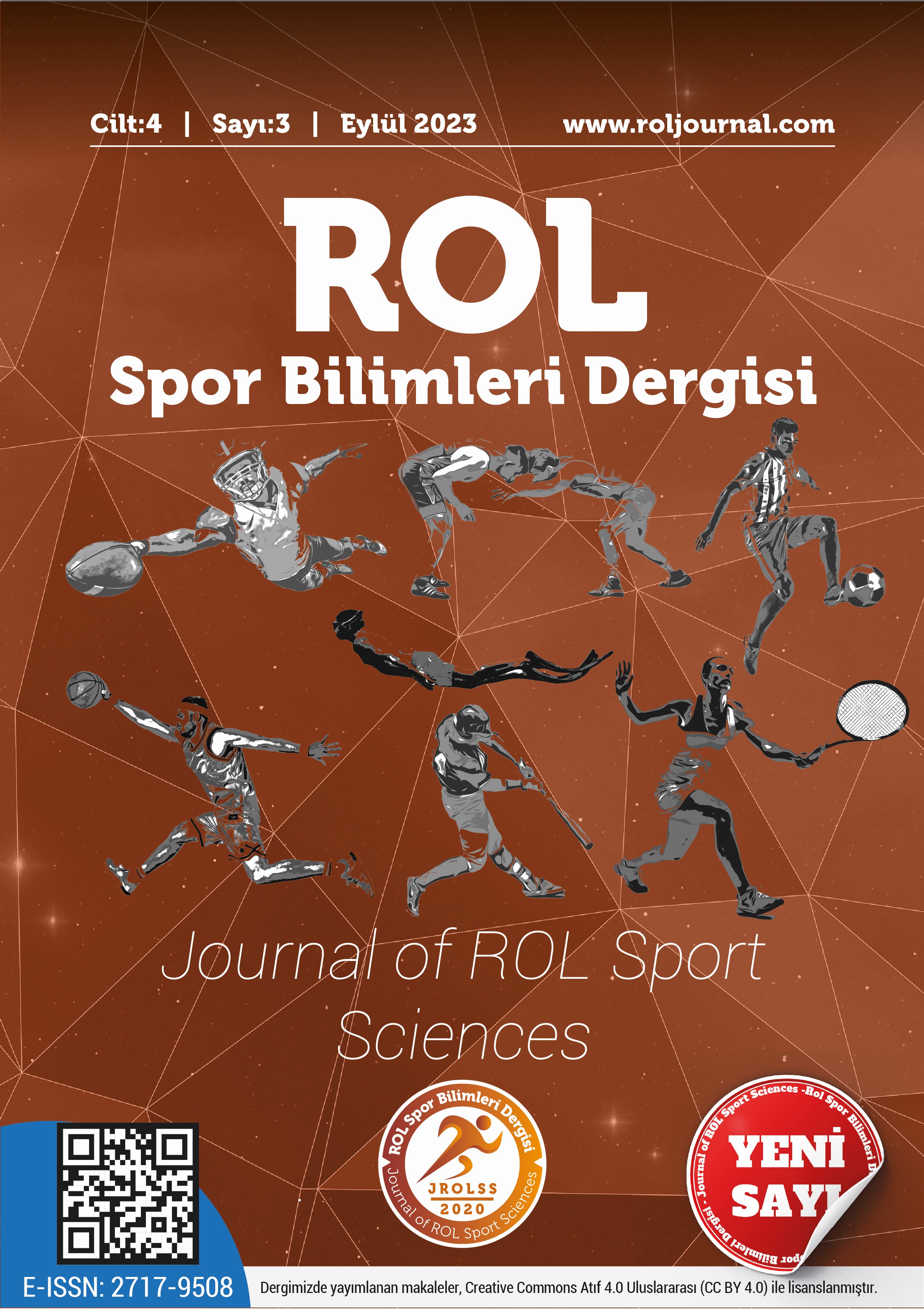Social identity approach to leadership in sport
DOI:
https://doi.org/10.5281/zenodo.8344852Keywords:
Group dynamics, identity leadership, social identityAbstract
Purposes of the research is to examine the effects of identity leadership on the social identity shared by team members in sports teams. A total of 336 athletes, including 182 men and 154 women, who were licensed, who were engaged in team sports in Çanakkale, participated in the research. Athletes responded to Social Identity Scale for Sport and Identity Leadership Inventory. In the study, the data were distributed normally. In the pre-analysis phase, independent sample t test and one-way analysis of variance were applied. Pearson correlation analysis and simple linear regression analysis were used. For post-hoc analysis, the Games-Howell test was administered with Bonferroni correction. In the study, the social identities of the athletes and the identity leadership behaviors of their coaches were found to be positively related. The identity leadership behaviors of the coaches positively affected the social identities of the athletes. The one-unit increase in the identity leadership behaviors of the coaches increased the social identities of the athletes by 0.55 units. The role of identity leadership in the social identity shared by the group members and the effectiveness of the social identity approach to leadership in the context of sports were supported.
References
Akfırat, S. (2017). Kimlik Liderlik Ölçeği’nin Türkçe formunun psikometrik özelliklerinin üniversite öğrenci örnekleminde incelenmesi. Türk Psikoloji Yazıları, 20(39), 51-65.
Avery, J. B., Avolio, B. J., & Luthans, F. (2011). Experimentally analyzing the impact of leader positivity on follower positivity and performance. The Leadership Quarterly, 22(2), 282–294.
Bruner, M. W., & Benson, A. J. (2018). Evaluating the psychometric properties of the social ıdentity questionnaire for sport (SIQS). Psychology of Sport & Exercise, (35), 181-188.
Bruner, M. W., Boardley, I., & Côté, J. (2014). Social identity and prosocial and antisocial behavior in youth sport. Psychology of Sport and Exercise, 15, 56–64.
Cameron, J. E. (2004). A three-factor model of social identity. Self and Identity, (3), 239–262.
Dunnet, C. W., (1980). Pairwise multiple comparison in the homogenous variance, unequal sample size case. Journal of the American Statistical Association, 75, 789-795.
Fransen, K., Steffens, N. K., Haslam, S. A., Vanbeselaere, N., De Cuyper, B., & Boen, F. (2016). We will be champions: Leaders' confidence in ‘us’ inspires team members' team confidence and performance. Scandinavian Journal of Medicine & Science in Sports, (26), 1455–1469.
Haslam, S. A., Reicher, S., & Platow, M. J. (2020). The new psychology of leadership: Identity, influence, and power.Routledge.
Hogg, M. A. (2001). A social identity theory of leadership. Personality and Social Psychology Review, 5(3), 184-200.
Martin, L. J., Balderson, D., Hawkins, M., Wilson, K., & Bruner, M. W. (2017). The influence of social identity on self-worth, commitment, and effort in school-based youth sport. Journal of Sports Sciences, 36(3), 326-332.
Norman, S., Luthans, B., & Luthans, K. (2005). The proposed contagion effect of hopeful leaders on the resiliency of employees and organizations. Journal of Leadership & Organizational Studies, 12(2), 55–64.
Rees, T., Haslam, S. A., Coffee, P., & Lavallee, D. (2015). A social identity approach to sport psychology: Principles, practice, and prospects. Sports Medicine, (45), 1083–109.
Reicher, S. D. (2017). La beauté est dans la rue: Four reasons (or perhaps five) to study crowds. Group Processes & Intergroup Relations, (20), 593-605.
Reicher, S. D., Haslam, A., & Platow, M. J. (2018). Shared social identity in leadership. Current Poinion in Psychology, (23), 129-133.
Scheepers, D., & Ellemers, N. (2019). Social identity theory. Springer.
Slater, M. J., Barker, J. B., Coffee, P., & Jones, M. V. (2015). Leading for gold: social identity leadership processes at the London 2012 Olympic Games. Qualitative Research in Sport, Exercise and Health, 7(2), 192-209.
Slater, M. J., Coffee, P., Barker, J. B., & Evans, A. L. (2014). Promoting shared meanings in group memberships: a social identity approach to leadership in sport. Reflective Practice, 15(5), 672–685.
Slater, M. J., Coffee, P., Barker, J. B., Haslam, S. A., & Steffens, N. K. (2019). Shared social identity content is the basis for leaders’ mobilization of followers. Psychology of Sport & Exercise, (43), 271-278.
Slater, M. J., Evans, A. L., & Barker, J. B. (2013). Using social identities to motivate athletes towards peak performance at the London 2012 Olympic Games: reflecting for Rio 2016. Reflective Practice, 14(5), 672–679.
Steffens, N. K., Haslam, S. A., Reicher, S. D., Platow, M. J., Fransen, K., Yang, J., … et al. (2014). Leadership as social identity management: Introducing the Identity Leadership Inventory (ILI) to assess and validate a four-dimensional model. The Leadership Quarterly, 25(5), 1001–1024.
Stevens, M., Rees, T., & Cruwys, T. (2021). Social identity leadership in sport and exercise: Current status and future directions. Psychology of Sport & Exercise, 55(1), 101931.
Sy, T., & Choi, J. N. (2013). Contagious leaders and followers: Exploring multi-stage mood contagion in a leader activation and member propagation (LAMP) model. Organizational Behavior and Human Decision Processes, 122(2), 127–140.
Tajfel, H. (1978). Social categorization, social identity and social comparisons. Academic Press.
Turkay, H. (2019). Futbolcularda sosyal kimlik bağlamında prososyal ve antisosyal davranışlar [Doktora tezi, Gazi Üniversitesi]. Sağlık Bilimleri Enstitüsü.
Turkay, H., Bayrakdaroğlu, Y., Yağan, Ü. N., & Başkan, A. H. (2020). Takım sporcusu gençlerde sosyal kimlik. Sosyal, Beşeri ve İdari Bilimler Dergisi, 3(8), 583-591.
Turkay, H., Yetim, A., & Sezer, P. (2018). Sporda Sosyal Kimlik Ölçeğinin Türkçeye uyarlanması. Akademik Sosyal Araştırmalar Dergisi, 6(78), 493-504.
Yap, B. W., & Sim, C. H. (2011). Comparisons of various types of normality tests. Journal of Statistical Computation and Simulation, 81(12), 2141-2155.
Downloads
Published
How to Cite
Issue
Section
License
Copyright (c) 2023 Journal of ROL Sport Sciences

This work is licensed under a Creative Commons Attribution 4.0 International License.

